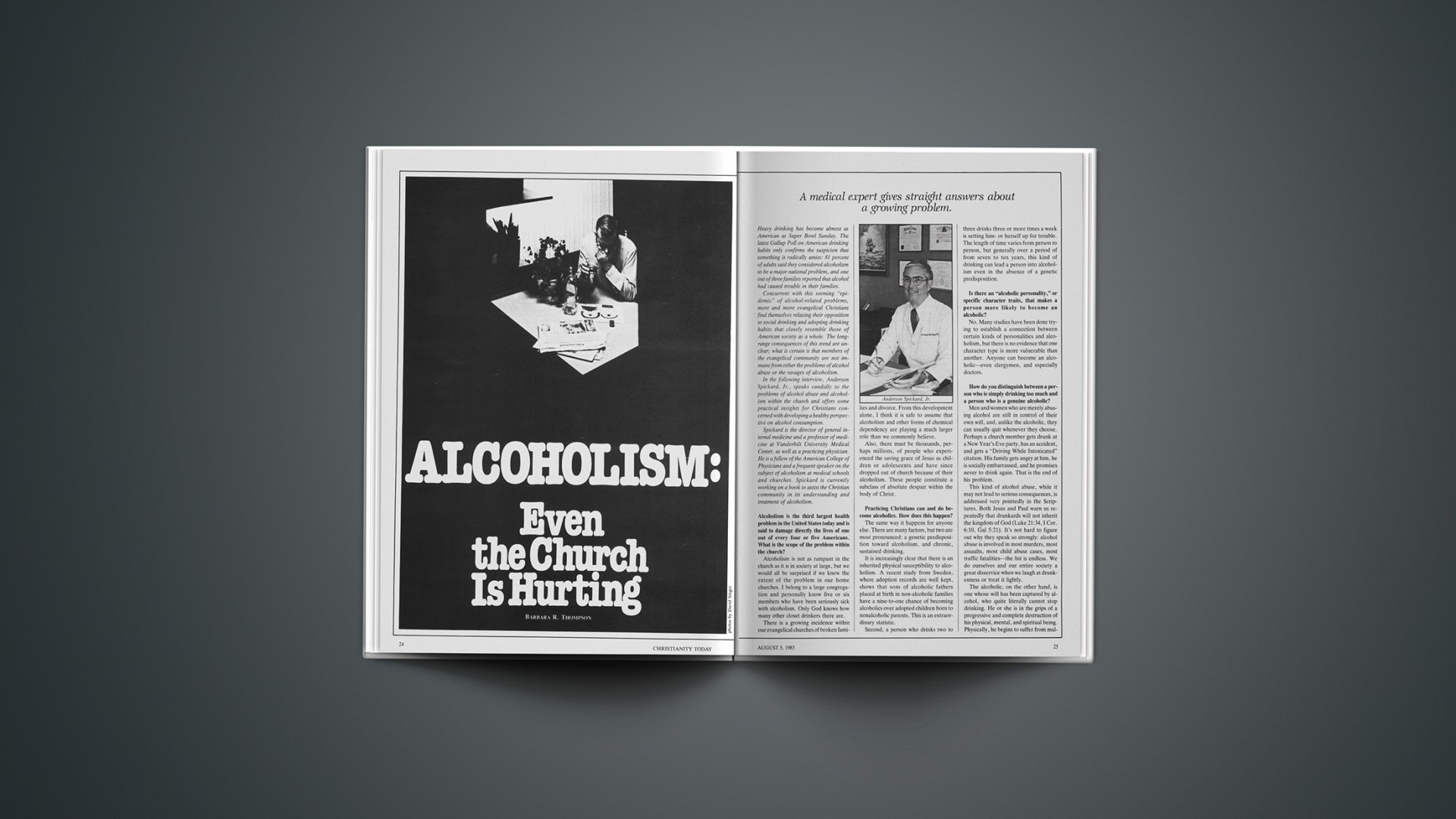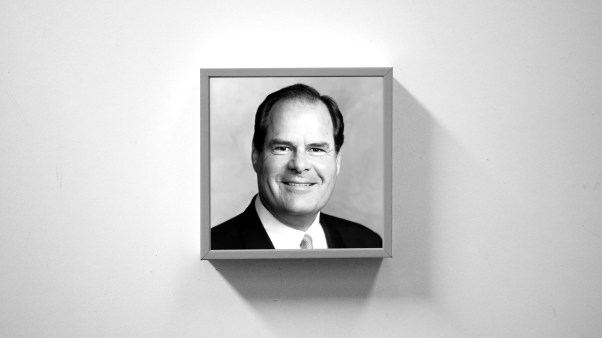BARBARA R. THOMPSON1Barbara R. Thompson is a free-lance writer who is a farm worker with His Farm Fellowship in Berne, New York. She is coauthor with F. Kefa Sempangi of A Distant Grief (Regal, 1979).
A medical expert gives straight answers about a growing problem.
Heavy drinking has become almost as American as Super Bowl Sunday. The latest Gallup Poll on American drinking habits only confirms the suspicion that something is radically amiss: 81 percent of adults said they considered alcoholism to be a major national problem, and one out of three families reported that alcohol had caused trouble in their families.
Concurrent with this seeming “epidemic” of alcohol-related problems, more and more evangelical Christians find themselves relaxing their opposition to social drinking and adopting drinking habits that closely resemble those of American society as a whole. The long-range consequences of this trend are unclear; what is certain is that members of the evangelical community are not immune from either the problems of alcohol abuse or the ravages of alcoholism.
In the following interview, Anderson Spickard, Jr., speaks candidly to the problems of alcohol abuse and alcoholism within the church and offers some practical insights for Christians concerned with developing a healthy perspective on alcohol consumption.
Spickard is the director of general internal medicine and a professor of medicine at Vanderbilt University Medical Center, as well as a practicing physician. He is a fellow of the American College of Physicians and a frequent speaker on the subject of alcoholism at medical schools and churches. Spickard is currently working on a book to assist the Christian community in its understanding and treatment of alcoholism.
Alcoholism is the third largest health problem in the United States today and is said to damage directly the lives of one out of every four or five Americans. What is the scope of the problem within the church?
Alcoholism is not as rampant in the church as it is in society at large, but we would all be surprised if we knew the extent of the problem in our home churches. I belong to a large congregation and personally know five or six members who have been seriously sick with alcoholism. Only God knows how many other closet drinkers there are.
There is a growing incidence within our evangelical churches of broken families and divorce. From this development alone, I think it is safe to assume that alcoholism and other forms of chemical dependency are playing a much larger role than we commonly believe.
Also, there must be thousands, perhaps millions, of people who experienced the saving grace of Jesus as children or adolescents and have since dropped out of church because of their alcoholism. These people constitute a subclass of absolute despair within the body of Christ.
Practicing Christians can and do become alcoholics. How does this happen?
The same way it happens for anyone else. There are many factors, but two are most pronounced: a genetic predisposition toward alcoholism, and chronic, sustained drinking.
It is increasingly clear that there is an inherited physical susceptibility to alcoholism. A recent study from Sweden, where adoption records are well kept, shows that sons of alcoholic fathers placed at birth in non-alcoholic families have a nine-to-one chance of becoming alcoholics over adopted children born to nonalcoholic parents. This is an extraordinary statistic.
Second, a person who drinks two to three drinks three or more times a week is setting him-or herself up for trouble. The length of time varies from person to person, but generally over a period of from seven to ten years, this kind of drinking can lead a person into alcoholism even in the absence of a genetic predisposition.
Is there an “alcoholic personality,” or specific character traits, that makes a person more likely to become an alcoholic?
No. Many studies have been done trying to establish a connection between certain kinds of personalities and alcoholism, but there is no evidence that one character type is more vulnerable than another. Anyone can become an alcoholic—even clergymen, and especially doctors.
How do you distinguish between a person who is simply drinking too much and a person who is a genuine alcoholic?
Men and women who are merely abusing alcohol are still in control of their own will, and, unlike the alcoholic, they can usually quit whenever they choose. Perhaps a church member gets drunk at a New Year’s Eve party, has an accident, and gets a “Driving While Intoxicated” citation. His family gets angry at him, he is socially embarrassed, and he promises never to drink again. That is the end of his problem.
This kind of alcohol abuse, while it may not lead to serious consequences, is addressed very pointedly in the Scriptures. Both Jesus and Paul warn us repeatedly that drunkards will not inherit the kingdom of God (Luke 21:34; 1 Cor. 6:10; Gal 5:21). It’s not hard to figure out why they speak so strongly: alcohol abuse is involved in most murders, most assaults, most child abuse cases, most traffic fatalities—the list is endless. We do ourselves and our entire society a great disservice when we laugh at drunkenness or treat it lightly.
The alcoholic, on the other hand, is one whose will has been captured by alcohol, who quite literally cannot stop drinking. He or she is in the grips of a progressive and complete destruction of his physical, mental, and spiritual being. Physically, he begins to suffer from malnutrition and from serious damage to his liver, digestive tract, and central nervous system. Emotionally and intellectually, he becomes increasingly preoccupied with drinking, with the need to deny that he has a problem, and with the frequent occurrence of blackouts—periods of time wherein the alcoholic acts perfectly normal yet later has no recall of any events that took place. Spiritually, the alcoholic drowns in guilt, in fear, and in shame; the more he loses control over himself, the more he is consumed by self-hatred.
Obviously these three areas—the physical, the mental and emotional, and the spiritual—are closely related. That is why some call alcoholism a disease of the body, soul, and spirit.
When doctors and mental health professionals refer to alcoholism as a disease, many Christians get nervous. They see this label as a behavioristic ploy, another “humanistic” interpretation of sin that denies the alcoholic’s responsibility for his own behavior.
Alcohol abuse—drunkenness—is a sin. The Scripture is clear on this point. But once a person is an alcoholic, once he has allowed his will to be captured by alcohol through its abuse, he is sick. He can no longer help himself. To tell an alcoholic to shape up and stop drinking is like telling a man who has just jumped out a nine-story building to fall only three floors. It just isn’t going to happen.
If we defined alcoholism as a physical disease, without a spiritual dimension, that might be humanism. There are many doctors and scientists looking for a physical cure for alcoholism. In my opinion, they won’t find it. A person can have a physical illness, like cancer or tuberculosis, and still be perfectly fine emotionally and spiritually. No one can have alcoholism without being completely down the tubes physically, mentally, and spiritually. He will not get well until he is treated in all three areas. To insist upon this fact is not humanism; it is a wholistic understanding of the patient.
Having said all this, I know that the disease model is still controversial. It is especially a problem in the medical community because, as of yet, no specific physical mechanism has been isolated as the cause of alcoholism.
Then what is the point of using disease terminology?
The point is to get the alcoholic out of the arena of social moralizing and into the hands of people who can help him. The common perception of alcoholics is that they are hopeless cases. Yet 60 to 70 percent of all alcoholics who enter treatment programs recover. That’s a remarkable statistic for any illness! (This high percentage applies to alcoholics in employee-assistance programs: those with strong jobs, family structures, and educational backgrounds.) So, while we are waiting for science to discover a biological mechanism whereby alcoholism can receive the label of “disease,” we can rescue many despairing alcoholics by getting them to the professional help they so desperately need. And the earlier, the better the prognosis.
Why can’t the alcoholic see his problem, with all its devastating physical and social affects, and help himself?
The alcoholic literally cannot see himself as sick. He can sit in front of you dead drunk, with a swollen red nose and a liver falling down to his pelvic brim, and he will still deny that he is an alcoholic. I had one patient who spent his days kneeling in front of a commode, vomiting up blood and intermittently drinking from a can of beer. As far as he was concerned, he didn’t have a problem.
This complete inability to see oneself as others do is popularly known as “the merry-go-round of denial.” It is the most tragic and least understood aspect of alcoholism. Even “recovering” alcoholics cannot give an adequate explanation of their own behavior. All they ever say is, “I must have been insane.” If you watch the process of denial long enough, it’s hard to argue with that diagnosis.
It is frequently said that alcoholics must hit rock bottom, physically and spiritually, before they are willing to accept help. Yet the longer an alcoholic drinks, the more he harms himself, and the less likely he is to recover. What can friends and family members do to stop the downward spiral?
It was an Alcoholics Anonymous adage that an alcoholic had to hit rock bottom before he could be rescued. Unfortunately, rock bottom often meant death, institutionalization, or suicide. And it is extremely difficult to stand by helplessly watching someone you love go through complete physical and spiritual deterioration.
The Johnson Institute in Minnesota has pioneered a process called “intervention,” which has successfully stopped the downward spiral for thousands of alcoholics and their families. The family comes together with the alcoholic’s employer, and the alcoholic is confronted with very specific examples of his behavior. The atmosphere is loving and non-judgmental, but firm. The accumulation of evidence creates an “artificial bottom,” and the walls of denial break down. The alcoholic is forced to see himself as he is and, it is hoped, accepts responsibility for his condition and enters a treatment program.
Is it necessary that a family seek professional help to intervene in a member’s life?
In my opinion, yes. For one thing, the family, through years of living with bizarre behavior and unpredictability, is usually as sick or sicker than the alcoholic. Second, interventions are very difficult.
By trial and error, I have learned some pretty terrible lessons. The second intervention I ever did was a hurry-up affair without proper planning. The patient was a close friend of mine, and he became literally consumed with anger when he was confronted with his behavior. His threats were so specific and substantial that I had to be followed around by the police for several days. To see this friend so uncontrollably enraged was one of the most traumatic events of my life.
The confrontation between light and darkness in an alcoholic can be excruciating. Emotions understandably run high when you have children saying things like, “Dad, when I brought my girlfriend home to meet the family, you told me you could take her any time you wanted to.” The hostility and anger that spills out of the alcoholic during these times can destroy a family that is not sufficiently prepared.
Once the intervention is successful, and the alcoholic has voluntarily entered treatment, he becomes the most grateful person you will ever know. He has been to hell and back, and the new birth he is experiencing is well worth any of the risks involved.
Why does alcohol have such a devastating affect on the spiritual lives of heavy drinkers?
Alcohol is a mood-altering drug that directly affects the part of our brain that controls inhibitions. We all have built-in prohibitions against certain kinds of behavior. When these restraints are lowered through the use of alcohol, we find it much easier to violate our own moral standards.
A man with perfectly fine family values might drink too much, become euphoric, and climb into bed with his secretary. When the alcohol wears off, he is left with deep feelings of guilt and shame—and maybe a case of herpes. If the sin goes unconfessed, the feelings are suppressed, but the memory is still very much alive. This memory continually chips away at the man’s already damaged moral life.
To put it another way, if you accept the fact that drunkenness is a sin, which I do, then heavy drinking is just one more way to quench the Spirit. God has put his light within us, and it has the potential to burn as brightly as Jesus himself. Sin darkens this light, and the darkness of drunkenness is as dark as anything there is in the world.
Do you think the church is responding adequately to the presence of alcoholics in its midst and in society at large?
No. The church should be in the forefront of efforts to help alcoholics because alcoholism has a pronounced spiritual dimension. Unfortunately, the church reflects the attitudes of society as a whole and looks at alcoholics as weak-willed and hopeless. Even well-meaning Christians tend to beat alcoholics over the head with a Bible, warning them to repent of their sin, and telling them not to come back to church until they can stop drinking. The alcoholic, no matter how sorry he feels, cannot stop—and he won’t be back.
Many church members successfully conceal their alcoholism for years. They go to their pastors complaining of family or personal difficulties, but the root of their problem is never recognized and confronted. As their alcoholism progresses, these people drop out of church altogether. They can no longer afford the mental anguish that comes from rubbing shoulders with people they perceive as evangelical. The Christian alcoholic becomes convinced that he has lost his salvation, and he doesn’t darken the door of a church again. In this way he is effectively cut off from the people who should be most qualified to help him.
What positive role can the church play?
A church in Montgomery, Alabama, provides a good model for all of us. The wife of a member came to the church asking for help because her husband was an alcoholic. The church investigated his problem, collected money to send him for treatment, mailed him get-well cards, prayed for him every day, and finally welcomed him home with a tremendous celebration. The “recovering” alcoholic was greeted as a prodigal son, as a man who was once blind and now could see.
Because this man was fortunate enough to have a loving, caring wife and congregation helping him on the road to recovery, today he is one of the most enthusiastic and productive servants of Jesus I have ever met. He too has been to hell and back, and in the process he has left nominal Christianity far behind.
To intercede in this way for alcoholics, the church must have a core of people who have educated themselves in the areas of chemical dependency and alcoholism. There are many helpful books available, and it is possible for anyone to become quite knowledgeable in only a short period of time. I tell people at church seminars that in two hours they will know more about alcoholism than 90 percent of all physicians.
This core group then can educate the rest of the church, and the community as a whole, through Bible studies, films, and creative workshops. Not every church needs to have its own counseling service, but someone in the church needs to know where to find the nearest professional help. And church doors should be opened to Alcoholics Anonymous and Al-Anon so that they can hold their meetings.
Many evangelical Christians feel uncomfortable with the vague spirituality of Alcoholics Anonymous, the emphasis on “God as you know him.”
I know there are some evangelicals who believe that the only bona fide recovery programs are those that name the name of Jesus. From my viewpoint as a physician, this is short-sighted and prevents many people from getting the help they need. Because of their concentration on God as a “higher power,” Alcoholics Anonymous has helped thousands of alcoholics from all religious persuasions, and Christian alcoholics have no trouble understanding this “higher power” as Jesus Christ.
Historically speaking, alcoholics repeatedly turned for help to the helping professions, to doctors and ministers, and received no help at all. Doctors, for example, tend to show alcoholics to the door as fast as possible, perhaps in the process prescribing Valium and creating a cross addiction. So alcoholics out of desperation turned to each other, and out of their fellowship and mutual support came Alcoholics Anonymous. From a group of people which everyone else dismissed as completely hopeless Alcoholics Anonymous has produced over one million “recovering” alcoholics. The testimony of these transformed lives cannot be dismissed out of hand.
In my own experience, with few exceptions, a person must first be sober before he can hear the gospel. I have a friend, a born-again surgeon and an alcoholic, who refused to go to Alcoholics Anonymous. He tried to get sober by going to Bible studies and prayer meetings, primarily because he didn’t want to admit he was a drunk just like everyone else. He never could stop drinking. Finally he humbled himself, admitted that he was powerless over his addiction, and went through the 12 steps of Alcoholics Anonymous. Today he is back at the Bible studies and prayer meetings, and faithfully serving God.
How frequent are instant conversions and healing among alcoholics?
Not very. But there is no question that some people are miraculously delivered from the power of alcohol. I had a paraplegic, alcoholic patient who came to my office one day and announced, “Doc, I’m saved, and I’m well!” His desire for drink went away instantly. These are the kinds of experiences we wish happened frequently, but they are in fact quite rare.
In my experience as a doctor, I’ve found that instant healings, or accelerations of the healing process that cannot be accounted for technologically, are most often the result of intercessory prayer. Many times intercessory prayer is the only way to bring down the spiritual powers that blind the alcoholic, and the church should take seriously its mandate to intercede in prayer on behalf of those caught in the web of alcoholism.
Does the search for an instant healing sometimes prevent the recovery of alcoholics through other means?
There is no question about it. Bill Wilson, who founded Alcoholics Anonymous, had an instant healing and urged everyone else to try and have one too. He finally realized that his efforts were not helping alcoholics get better. In fact, instant healings are the Lord’s business, and we cannot predict if and when they will occur.
In my experience, it is sometimes the case that “quickie” conversions do well for a couple of weeks, until the wheels start coming off. The addiction returns, the craving persists, and the alcoholic still has a host of family and personal problems with which to contend. At this point, he can become discouraged, and sometimes he will just completely give up.
We need to make sure we don’t mislead such people with a superficial understanding of the gospel. God can certainly resolve any of our difficulties immediately, but all of our problems are not going to disappear. The alcoholic may be completely freed from his addiction, but he and his family members still have residual physical, emotional, and spiritual problems. This is another reason why we need to be wholistic and treat all three aspects of the illness.
In God Is for the Alcoholic, Jerry Dunn says, “Alcoholism starts with social drinking, not a problem personality.” He goes on to argue that alcohol itself is a defective product and that the Christian’s response should be total abstinence. What do you think?
He has a good point. I think we would be better off without any alcohol. Many people disagree, but those of us who take care of the disasters would certainly like to see an alternative method of relaxation. Unfortunately, drinking is as old as the Bible, and it isn’t just going to disappear.
What do you think a Christian’s attitude toward alcohol should be?
I am not going around advocating total abstinence for the entire Christian community; it seems clear from the Bible that Christians in the past drank fermented beverages, and many Christians today drink as a matter of personal liberty. At the same time, I myself no longer drink, and I think there are good reasons why all Christians should give total abstinence serious consideration.
First, Christians who have any evidence of alcoholism in their family history—father, mother, sister, brother, grandfather, uncle—should never drink at all. These people need to take seriously Paul’s injunction to flee from sin. One Christian man, who descended from four generations of alcoholics, recently asked me if that meant he would have to give up even an occasional beer with the boys. I had to tell him, “Yes, that’s exactly what it means.” In the presence of a family history of alcoholism, any drinking is foolish.
I also believe that ministers, elders, deacons, and other church leaders should consider the Nazarite vow as ideal and abstain from drinking altogether. A church leader who is drinking and perhaps occasionally getting a little tipsy is lowering the Spirit’s power output for his people. Drunkenness, even if it is accidental, quenches the Spirit, and it is unwise for a church leader to take that risk. There is too much at stake.
Finally, all Christians need to consider seriously the effect that alcohol has on the part of our brain that controls inhibitions. As followers of Jesus we are involved in spiritual warfare and constantly facing temptations. Even when we are at our best, when our inhibitions are in full force, it is often difficult to resist the subtle stratagems of Satan. To deliberately lower our inhibitions, in a time of warfare, is really quite foolish.










